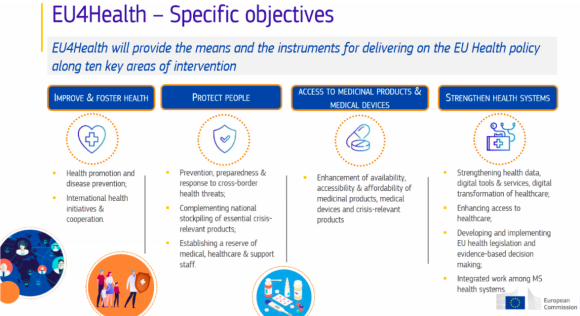
The EU4Health Programme could be summarised in three words: prevention, digitalization, and cooperation. Developed as an answer to the COVID-19 crisis, it promises to look beyond the pandemic and launch the Union into a more cohesive, healthier future. Will it be successful?
By Anna Credendino. (Edited by Marta Silvia Viganò)
Imagine a single, efficient healthcare system for the whole European Union. Professionals share clinical information about their patients and exchange treatment options through a common database. The quality of medical practices is the same everywhere. Patients have direct access to their data with a single click. Innovation is speeding up. All harmoniously working like a well-oiled machine.
Does it sound like science fiction? Perhaps. But that’s the direction the EU is moving towards.
Healthcare is a hot topic right now. The pandemic has dramatically highlighted the necessity of a solid healthcare system – from reliable infrastructures and a strong workforce to efficient prevention and coherent communication. The demand for a plan to strengthen and/or improve the current state of affairs is strong. The EU4Health Programme is the EU’s answer.
EU4Health is one of the Union’s funding programmes in the health field and will run from 2021 until 2027. It has some distinctive characteristics that make it stand out, especially in comparison to its predecessors: this time, the focus is largely on prevention, there are ample funds, and non-State actors – such as NGOs, patients associations, and health workers themselves – can be involved directly.
While the programme did develop in response to the COVID-19 emergency, it doesn’t stop there – on the contrary, it promises to cover various thematic areas and be intersectional. During the Info Session held on the 12th of October, Isabel De La Mata Barranco, Principal Adviser for Health and Crisis management, said that “human health is not isolated but it’s linked to animal health and to the planet’s health” in general – a sentence that perfectly summed up the spirit of EU4Health.
In order to reach the programme’s objectives, the EU is investing 5.3 billion euros, a large part of which will go to prevention strategies. An already running example is Europe's Beating Cancer Plan, a programme presented by the Union on the eve of 2021’s World Cancer Day. The plan is there to improve survival rates and reduce healthcare inequality among different regions, but it also aims to tackle cancer’s risk factors such as tobacco use, alcohol consumption, environmental pollution, hazardous substances, and physical inactivity, as well as some viral agents that can be eliminated by vaccines.
Does the last world ring a bell? Increasingly under the spotlight due to and throughout the covid crisis, vaccines are a priority for EU4Health: several articles of its regulation are dedicated to them, their use, and their development.
As with most of the Union’s programmes, regions play a crucial part. Thanks to the Best Practice initiative, it has become easier to share what each region does best in the area of health promotion, prevention, and non-communicable diseases so that it can be replicated elsewhere. The dedicated Best Practice Portal publishes those practices evaluated as “best” and gives the chance to regions to be evaluated by the Commission-appointed Steering Group on Health Promotion, Disease Prevention and Management of Non-Communicable Diseases.
As they say, sharing is caring, which is why EU4Health encourages cross-border cooperation in several areas, but especially when it comes to digital practices. With the creation of a European Health Data Space (EHDS), practitioners will be able to share patients’ clinical information with each other, even from countries hundreds of thousands of kilometres apart, and patients will actually have access to and control over their data directly. The pandemic has accelerated the digitalization of many States’ healthcare systems, which is one of the reasons why EHDS doesn’t look like a mirage anymore – what can be done locally can also be done internationally.
The project is lacking in some aspects, though. The programme recognizes that inequalities across regions in the field of health should be addressed in order to respect the EU’s core values and have substantial results. Beyond generic promises of support to other EU’s programmes, however, it’s unclear what actions are going to be taken to do so.
EU4Health is an ambitious project, for sure. But when the going gets tough, the EU gets going – or tries, at least – and the pandemic has definitely been a tough challenge to measure with.
If there’s anything that COVID-19 has taught us is that health is the one thing we can’t compromise on. The European Union is investing large sums and energy through the EU4Health Programme to make sure that it won’t happen again. Will it be successful? Time will tell, but one thing is for certain: the EU is a union of States. Member States will have to do their part to the best of their abilities and cooperate to build a better and more equal healthcare everywhere in the Union. Efficient healthcare doesn’t have to be relegated to science fiction – let’s make it a reality, together.



